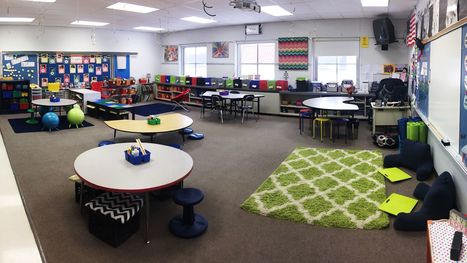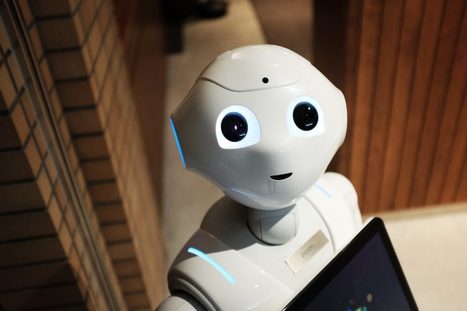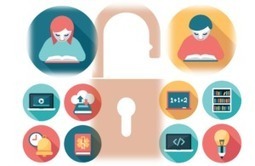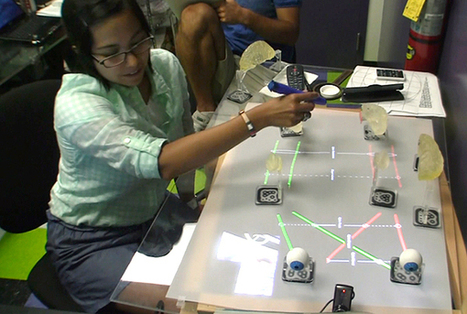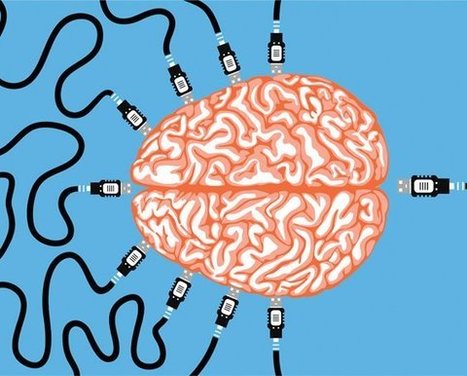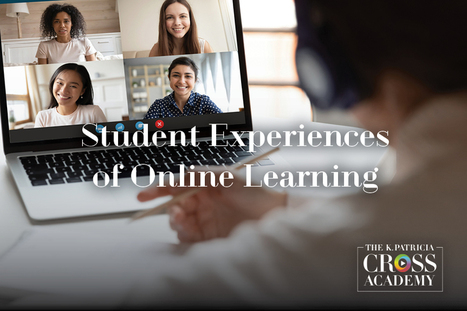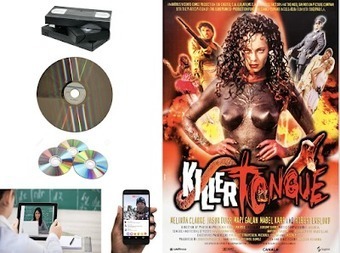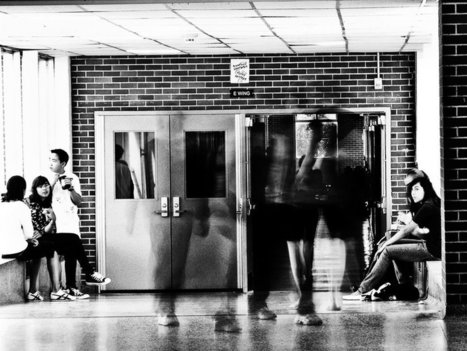 Your new post is loading...
 Your new post is loading...
A 2020 study revealed that learning how to code resembles learning a language like French or Chinese—challenging entrenched beliefs about coding.
There is a belief that younger people are fully engaged with the digital world. But I am currently leading a project exploring people’s knowledge and use of online data, and the preliminary findings from our research has found that data literacy is not uniformly high among younger people, as is often assumed. Instead, some young people have very low levels of data literacy.
Teachers can guide students to avoid ineffective studying habits in favor of ones that will increase their learning outcomes. Too often people imagine that long hours of studying are the best path to being a model, straight-A student. Yet research shows that highly successful students actually spend less time studying than their peers do—they just study more effectively.
Picture this: It’s Monday and Ms. D’Angelo, a seventh-grade science teacher in the South Bronx, gives her students a homework assignment about food chains that is due in one week. The assignment asks students to teach a family member about this concept by completing a model food chain together. The following Monday, Ms. D’Angelo is surprised to see that that some of her students seem to understand the material at a deep level—they even use new vocabulary terms with great fluidity. These same students appear be much more confident than usual when engaging in the class discussion. Ms. D’Angelo scans her grade book and notices that these students are the same the ones who completed the homework assignment.
Researchers are gaining a better understanding of how people learn—both what works and what doesn’t go so well—in the classroom. The next step is to apply that research in actual college instruction.
One person pushing to put learning science into practice on college campuses is Sanjay Sarma, vice president for open learning at the Massachusetts Institute of Technology.
Researchers studied students’ brains as they learned and took another look at the marshmallow test, learning styles, and growth mindset. Education research continues to remind us of the powerful impact teachers have on children. This impact is overwhelmingly positive—the studies we highlight here demonstrate specific ways in which teachers can or already do help students feel a sense of belonging in school and make gains in learning. There are areas for improvement, though: Researchers have shown that different rates of suspensions and expulsions for black and white boys have more to do with adult perceptions of those kids than with their behaviors.
Common Sense Media’s latest report, co-authored with USC Annenberg, into the ‘new normal’ of media use in UK families reveals that while parents report a sense of anxiety and some conflict with their teens around media, most believe that digital technologies have actually reduced tensions. Despite anxiety, both parents and teens are largely optimistic about the benefits their devices bring, writes Sonia Livingstone. Sonia is Professor of Social Psychology in the Department of Media and Communications at the London School of Economics and Political Science.
In this session, we will present data from a University of Leeds ESRC Newton funded research grant conducted in collaboration with the University of Cape Town. We will contextualise the study in the existing literature around marketization, unbundling and digital technology, and give an overview of our research in South Africa. We will then focus on data collected from the UK higher education sector, through desk research and interviews with senior HE leaders. Our session will involve a presentation of our research data, including demonstration of novel interactive visualisations. Participants will be able to view these visualisations themselves during the session, and manipulate the data. We will pose several critical questions to the audience during the session, and invite responses digitally through a Padlet wall. At the end of the session, we will take questions from the audience about our research findings. The session strongly relates to the theme of critical perspectives of learning technology, as our research project is focussed on the benefits and challenges of the growth in unbundled online learning from universities, and the impact this is having on access, equality, flexibility, institutional mission and the changing nature of higher education.
There are plenty of studies that isolate the effects of light, acoustics, or air quality on learning. But the research on flexible classrooms is frustratingly scarce.
There are good reasons for the apparent lack of interest. Variables like natural light and acoustics lend themselves to single-factor experiments that can be conducted in a laboratory setting. Give subjects a task to complete in a room with ample windows, for example, and then administer the same test in a room without them.
If you are involved in education technology in any way, you must stay up to date on the latest news and trends. Educational technology is growing at immense speed – practically changing every day. The best place to find out quality information from trustworthy sources is in EdTech research journals. These journals publish articles by EdTech entrepreneurs and educators providing the information you need.
he term open education has recently been used to refer to topics such as Open Educational Resources (OERs) and Massive Open Online Courses (MOOCs). Historically its roots lie in civil approaches to education and open universities, but this research is rarely referenced or acknowledged in current interpretations. In this article the antecedents of the modern open educational movement are examined, as the basis for connecting the various strands of research. Using a citation analysis method the key references are extracted and their relationships mapped.
A study from the Stanford Graduate School of Education of how students best learned a neuroscience lesson showed a distinct benefit to starting out by working with an interactive 3D model of the brain.
Researchers have known that “artificial neurons” could carry out logical functions—i.e., learn the way humans do—since 1943. The term “artificial intelligence” has been around since its introduction at a science conference at Dartmouth University in 1956. But only in the past several years have we started seeing theory put into practice the way those researchers imagined. We now have machines that can translate languages, compose music, write novels, and operate vehicles.
|
Higher education institutions have been scrambling to meet the demand for remote and online courses. This has been due in part to general growth trends in online enrollment, but it has also been accelerated out of response to the Covid-19 pandemic. Because of this, we have focused on helping faculty teach more effectively online.
In this blog, we turn our attention to the learning experiences these courses provide students. Understanding students’ experiences in online courses has implications on the effectiveness of teaching strategies. A look at published research shows several factors related to the quality of student experiences that faculty can address when developing their online courses.
Video for learning is great at some things, not so great at others. Some time back I attended a session on video for learning and found that neither the commissioners nor the video production company had looked at a single piece of research on video and learning. They told us that people loved the work and since then I’ve seen a lot of 'Netflix for learning’ delivery. That’s fine but let’s step back a minute..What I didn’t see was much evidence that people were actually ‘learning’ much. I have been involved in video production for 35 years, from corporate videos delivered on VHS cassettes, interactive videos on Laservision (in many ways way beyond what we currently see), CD-ROMs and now streamed. We even made a feature film The Killer Tongue – lost a pile of money on that one and lesson learnt.
Video is great for emotional impact and so attitudinal shift, showing processes and procedures, moving objects, going inside things down to the micro-level or to places we can’t get to like space or the inside of a nuclear reactor. It can also present people, talking to you. But what works best for LEARNING? The evidence shows that many of the things we do in video are just plain wrong. There’s decades of research on the subject, that mostly remains unread and unloved. For a good summary, read Brahme (2016). So let’s surface a few of these evidence-based pointers.
Reading from screens has become increasingly prevalent in education, but there continues to be debate over whether that is desirable. As the latest rebuttal to the promotion of electronic text, a meta-analysispublished this year found reading from a screen negatively affects reading performance compared to reading from paper. However, higher education and K-12 alike continue to invest in e-textbooks and other digital materials. “I want all students to be able to learn from digital textbooks,” President Obama said in his 2011 State of the Union address.
Jack Silva didn't know anything about how children learn to read. What he did know is that a lot of students in his district were struggling.
Silva is the chief academic officer for Bethlehem, Pa., public schools. In 2015, only 56 percent of third-graders were scoring proficient on the state reading test. That year, he set out to do something about that.
"It was really looking yourself in the mirror and saying, 'Which 4 in 10 students don't deserve to learn to read?' " he recalls.
While multiple-choice quizzes can be useful for gauging how well students understand a topic, they can interfere with learning if poorly designed, according to a review of recent research. Andrew Butler, a professor of psychological and brain sciences at Washington University, specializes in the malleability of memory—how memories can fade or be reinforced over time. In a recent article in Journal of Applied Research in Memory and Cognition, he explains that despite the popularity of multiple-choice quizzes, they’re often not aligned to the latest scientific findings about how students process and retain information.
Information literacy (IL) instruction improves student persistence, GPA levels, and graduation rates. Designing a successful IL program can be daunting, however our new handbook will break down each step in the process with current research, examples, and activities.
The full handbook will come out later this year, but you can begin making an immediate impact at your institution by downloading new section releases throughout the fall!
59% of U.S. teens have been bullied or harassed online, and a similar share says it's a major problem for people their age. At the same time, teens mostly think teachers, social media companies and politicians are failing at addressing this issue.
Has your to-do list ever been so long that you felt physically drained at the thought of everything that needed to be done?
New research has shed some light on the reason behind this feeling and shows that overloading students causes not only academic stress, but also takes a toll on students’ mental and physical health, which, unsurprisingly, hinders learning.
New survey data challenge perceptions about first-generation college students, showing strong academic engagement and commitment to college. But the group lagged behind their peers in social comfort and resiliency.
Education scholars say youth are duped by sponsored content and don't always recognize political bias of social messages.
When it comes to evaluating information that flows across social channels or pops up in a Google search, young and otherwise digital-savvy students can easily be duped, finds a new report from researchers at Stanford Graduate School of Education.
The report, released this week by the Stanford History Education Group (SHEG), shows a dismaying inability by students to reason about information they see on the Internet, the authors said. Students, for example, had a hard time distinguishing advertisements from news articles or identifying where information came from.
As the fall final exam season creeps up, students are returning to their notes and — hopefully — recalling everything they learned this semester. But what kind of notes do they have, and will those notes be helpful? We wondered whether taking notes via pen and pencil versus typing made a difference for students. Here’s what we found!
2015 was a great year for education research. fMRI technology gave us new insight into how exercise can improve math ability by changing the structure of children's brains (#13 below). We saw how Sesame Street's 40-year history has made an impact on preparing young children for school (#7). Several studies reinforced the importance of social and emotional learning for students (#2, 5, and 9). Two must-read publications were released to help educators understand how students learn (#4 and 11). Here are 15 studies published this year that every educator should know about.
|

 Your new post is loading...
Your new post is loading...
 Your new post is loading...
Your new post is loading...












